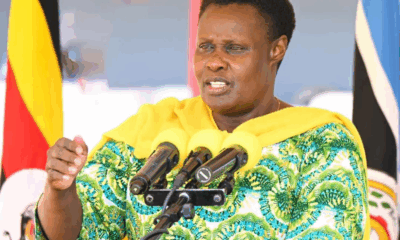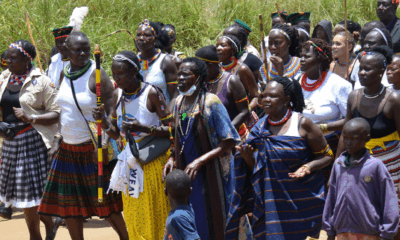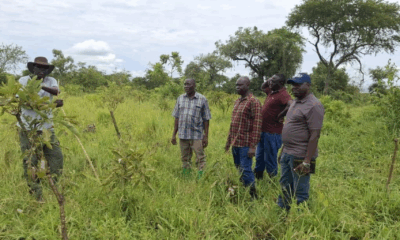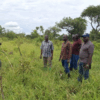News
Locals use mobile phones to report forest abusers

forest
In an effort to engage the general public in the conservation of the country’s forest resources, the civil society has developed a mobile phone platform that will help in reporting the degradation of Uganda’s forests.
Marking the International Forest Week conversationsts noted that for effective protection of the forests, it is important for communities near the forests to own them and report any illegal activities.
The Community-based Monitoring system that uses mobile phone technology was designed by a consortium of non-governmental organizations including Anti-Corruption Coalition Uganda and Care International in partnership with the National Forestry Authority.
The system establishes monitors and communities empowered information upon which communities can act. Community members are expected to observe a suspicious activity and file a report to the duty bearer by sending a free text message using their mobile phones to 6006.
The Head of Programs at the Anti-Corruption Coalition Uganda Felix Kafuma says the community based Monitoring platform empowers the ordinary citizens to use their mobile phones to send text messages to the duty bearers prompting them to take immediate actions to stop the illegal tree cutting and related crimes.
“This gives an opportunity to community members to monitor the Forest sector using a mobile phone application through an ordinary sms (short Messages) or a smart phone application whereby you report the forest related crimes either in real time or with even evidence to the duty bearers for action to be taken”
Meanwhile the state Minister for Environment Flavia Munaaba says that because Uganda is losing about 1.3 million hectares, communities have a challenge of getting involved in the provision of solutions towards protection of the forest resource that is linked to their livelihood.
Contributing to the theme of Forest governance, the minister stressed that community members need to appreciate the benefits they get from the forest and subsequently be able to protect them
Munaaba says that Forest governance should start with individual practices at all levels, for instance people reducing on the amount charcoal and firewood they use in their homes. She noted that this can be done by opting for alternative fuel.
“Government is promoting the use of biogas through the household income generating initiatives whereby a household gets a heifer whose waste can be used for biogas generation and then also the solar power can be encouraged and electricity renewable energy sources is available”-Munaaba
Currently only 12% of Ugandans can access alternative fuel according to the minister.
So what we have been lamenting is the absence of a mechanism that interests the local communities or supports them to embrace and use these initiatives so we would like the civil society to advocate for hands on-she added
The minister added that government is encouraging community tree planting and seedlings are being distributed to members of the public for planting.
Establish TREE FUND
In a related development, the National Forestry Authority (NFA) has expressed the need for the establishment of the Tree Fund to cater for conservation of the Ugandan Forest resources.
According to the National Forests and Tree planting ACT passed in 2003 proposed a Tree Fund but since then it has never been implemented.
In an interview with The Sunrise Newspaper, the Executive Director National Forestry Authority, Michael Mugisa said that since 2003 when this law came into effect it is unfortunate that the Tree Fund has not been established to date.
“But we are making every effort to ensure that the Ministry of Finance establishes the Fund where government, donors can put monies then there will be serious forest protection and tree planting in the whole country” said Mugisa
Mugisa further notes that debates by economists should not stop the establishment of the proposed Tree Fund since similar funds like the Road Fund have been put in place without affecting the country’s Macro-economic stability.
“While the debate is there that as government establishes more funds for different sectors it destabilizes the Marco-economic management of the economy but we have seen Road Fund working , we have seen the Energy Fund working, why not the Tree Fund”-Mugisa asked.
Mugisa says having a Tree Fund would go a long way in protection Forests and conserve the environment across the country.
Meanwhile Mugisa revealed that new regulations will soon be out to strengthen the mandate of the National Forestry Authority to ensure that the authority oversee the management of Forests on private land.
Musiga says that the biggest percentage of degradation, encroachment and destruction of forests is mainly on private land yet the Authority is only responsible for central Forest reserves.
He reported that to date majority of de-forestation degradation of the environment which is estimated to be at 80% is in the private lands where NFA has no direct control. While it is estimated that 30% of the central forest reserves are destroyed and encroached upon but the vast degradation is in the private land where there is no control according to Mugisa.
However officials at the Authority are optimistic that after issuance of the proposed new regulations, the Authority will step up its mandate to protect the country’s forest cover.
Mugisa added that the NFA is working hard to increase sector coordination, so it has stepped up coordination with district forest services.
“We have come up with forest regulations which the minister will gazette and people will know them and we continue to mobilize to create awareness and ensure that responsible persons, the district forest services and district councils play their part”-Mugisa.
Uganda has witnessed huge forest degradation over the years this resulting into deforestation and it’s worth noting that total forest cover declined from 24% in the year 1990 to 18% in the year 2005. As of 2007 Uganda’s forested area stood at 17.5% of the land area and it dropped to 15% in 2010 yet the ideal situation for proper ecological functioning the forest cover should be standing at 30%.
This continued de-forestation could have serious implications on the availability of water, food safety if there are no timely interventions.
slubambula[at]gmail.com
Comments


















